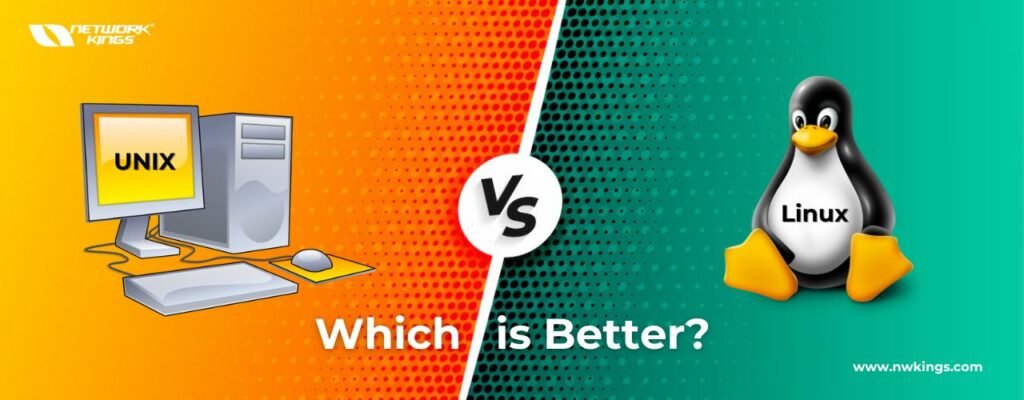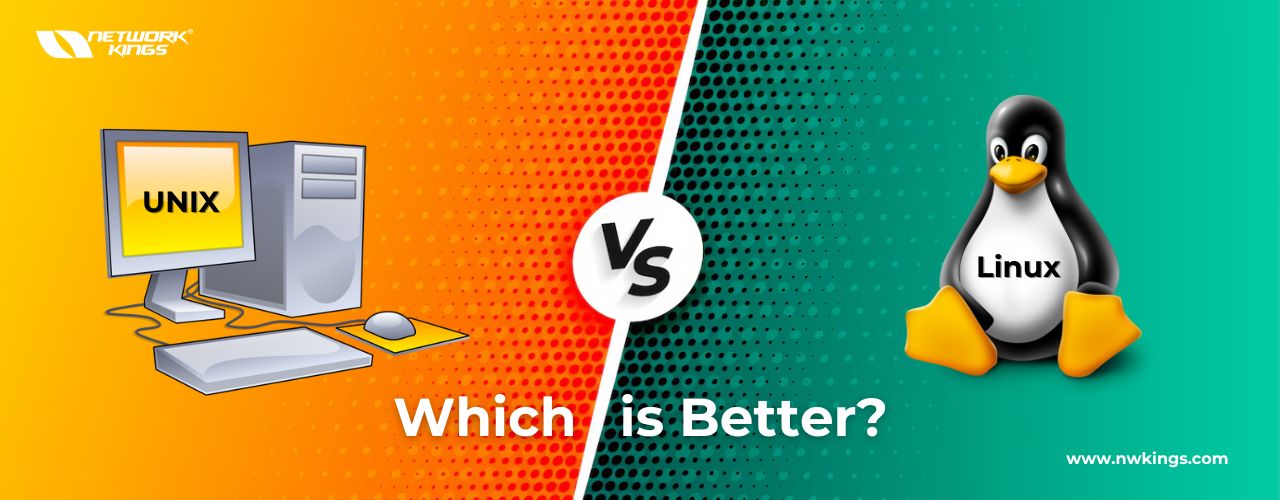
Compare and contrast Unix vs Linux in this comprehensive guide covering use cases, components, features, and best platform where you can learn Linux course online.
If you know about Linux, you may have noticed that Linux is also termed a Unix-like operating system. Unix and Linux have various similarities but they do possess some differences too. Hence, they are different in one way or another. Let us see what Unix vs Linux brings for you and which is better.
Unix vs Linux: What’s the Difference
Linux | Unix | |
Development | Linux is an open-source OS launched by the Linux Community of Developers. | Unix is not an open-source by AT&T Bell. |
Cost | Linux is free under a General Public license. It has zero cost. | It is a licensed OS and costs around $1407. Although some versions of Unix are free. |
Supported File System | It contains supported file systems like- Ext2, Ext3, Ext4, Jfs, Xfs, LXDE, etc. | It contains supported file systems like- fs, gpfs, hfs, hfs+, ufs, xfs, and zfs. |
GUI | Linux mainly uses GUI like- KDE & Gnome, LXDE, Xfce, Unity, Mate, etc. | Unix is a command-based OS and almost every command-based OS has Gnome. |
Usage | Linux is a widely used OS. It is used in desktops, servers, smartphones to mainframes. | Unix is for servers, mainstations, and PCs. |
Default Shell | The default shell name of Linus is Bourne Again SHell or BasH. | Unix’s default shell is Bourne Shell. |
Target Processor | The target processor for Linux was Inter’s x86 but now it is the processor for 20+ families. | Unix supports PA-RISC and the Itanium family. |
What are the common Unix use cases?
Here are the common Unix use cases:
Servers: Unix is reliable, efficient, and secure. Servers like Nginx and Apache use Unix.
Workstations: Unix is also a renowned choice for workstations, particularly for scientific and engineering applications. Unix workstations are meant for tasks such as data research, software development, and computer-aided design (CAD).
Personal Computers: Unix is also used on PCs. However, it is not as ordinary as other operating systems like Windows and macOS. Unix is the right choice for users who want a strong and customizable operating system.
What are the common Linux use cases?
Here are the common use cases for Linux:
Servers: Linux is mostly used for server OS for web servers, database servers, file servers, email servers and any other type of shared server.
Multithreading applications: Linux can handle multithreading and support high-volume.
Manages servers: Linux directly controls a system’s hardware and resources, like CPU, memory, and storage.
Unix vs Linux- Which is more affordable?
Unix and Linux are both operating systems used in the tech industry, but they have some distinctions, especially in affordability.
Unix is home to operating systems that contain proprietary versions such as Solaris, HP-UX, and AIX, among others. These Unix variants often come with significant licensing fees, especially for enterprise-grade deployments. The starting cost of getting a Unix license and continued support fees can change it quite costly for businesses.
On the other hand, Linux, while roused by Unix, is an open-source operating system. This means that it can be willingly distributed, changed, and used by anyone. There are many dispersals of Linux available, such as Ubuntu, CentOS, and Debian, each with its stability and targeted usage. Since Linux is open-source, there are generally no licensing fees with it, making it greatly reasonable for both personal and enterprise usage.
What are the Unix vs Linux components?
Unix and Linux have three components in common but the roles of these components differ in Unix vs. Linux. Let us have a look at the same.
- Kernel. The kernel is the main part of an operating system. It’s the interface where recommendations for procedures happen.
- Shell. The shell decodes command line input and initiates action from the essential programs. You can think of it as a translator that handles communication between the user and the kernel since the kernel cannot comprehend direct user input.
- Application programs. Unix systems have a core set of utility programs that allow users to take actions like file management.
Unix Kernel vs. Linux Kernel: The kernel is the main element of both Unix and Linux operating systems. Both Unix and Linux kernels are monolithic, and the whole of the OS is working in the kernel space. Monolithic kernels manage all hardware and driver operations. However, the Unix kernel is more extensive and complicated than its counterpart.
Unix vs. Linux Servers: Unix is typically used for high-end server operations and other back-end tasks demanding technical hardware architecture. In contrast, Linux is readily downloadable and operable. Linux device drivers can be built into the kernel. Part of Linux’s popularity in the web server space can be attributed to its low installation costs.
Unix vs. Linux Commands: Linux developers desired to save their commands as equally as likely as Unix commands by sticking to the movable operating system interface (POSIX) standards set by the Institute of Electrical and Electronics Engineers. Many core commands are similar in syntax and functionality, including tar and lpr. Small differences are still there, not only between Unix and Linux but among other Unix variants as well.
Note: As we know Unix is a bit difficult to go for as it may not be pocket-friendly to everyone. Hence, Linux is more in demand than Unix. There are around 37k+ job vacancies in the Linux field whereas Unix only has 3100 job vacancies. Let us discuss how you can initiate in the Linux field.
Learn Linux with Network Kings
Linux certification is one of the most promising open-source operating systems leading the Red Hat Linux syllabus. The Linux Certification course prepares Linux Installation, Administration, Configuration, Troubleshooting, and Operating System tools. Linux training also allows you to write Shell scripts and command lines.
In this Linux training, you will learn:
- Understand and Use Essential Tools
- Create Simple Shell Scripts
- Operate Running Systems
- Configure Local Storage
- Create and Configure File Systems
- Deploy, Configure, and Maintain Systems
- Manage Basic Networking
- Manage Users and Groups
- Manage Security
- Manage Containers
Why you should choose Linux training from Network Kings?
You will get benefits like:
- Numerous Languages: Select Hindi and English.
- 24X7 service: To answer your questions.
- Industry relevant Syllabus: Most outstanding resources to understand from.
- Get Certified: Get a completion certificate.
- Red Hat labs: You get access to the exclusive Red Hat virtual labs if you enrol in the Red Hat Linux course at Network Kings.
- Training by top-notch Linux professionals: Get trained directly by Linux professionals with more than 12 years of experience in the industry.
What are the job opportunities with the Linux course?
Job opportunities with the Linux course are:
- Linux System Administrator
- Linux Network Administrator
- DevOps Engineer
- Cloud Engineer
- Site Reliability Engineer
- IT Support Engineer
- Security Analyst
- Software Developer
- Database Administrator
- IT Manager
- System Engineer
- Virtualization Engineer
- Storage Administrator
- Automation Engineer
- Network Engineer
- Infrastructure Engineer
- Technical Support Engineer
- IT Consultant
- Quality Assurance Engineer
- Penetration Tester
What are the salary expectations for the Linux Course?
Salary varies from country to country and state to state. Here are salary expectations for Linux courses in different countries.
- United States – USD 70,000 – USD 150,000 per year
- Canada – CAD 60,000 – CAD 120,000 per year
- United Kingdom – £35,000 – £70,000 per year
- Germany – €45,000 – €90,000 per year
- France – €35,000 – €70,000 per year
- Australia – AUD 75,000 – AUD 120,000 per year
- New Zealand – NZD 60,000 – NZD 100,000 per year
- United Arab Emirates – AED 90,000 – AED 200,000 per year
- India – INR 500,000 – INR 1,500,000 per year
- Singapore – SGD 60,000 – SGD 120,000 per year
- Hong Kong – HKD 350,000 – HKD 700,000 per year
- Japan – JPY 5,000,000 – JPY 10,000,000 per year
- South Korea – KRW 40,000,000 – KRW 80,000,000 per year
- Brazil – BRL 60,000 – BRL 120,000 per year
- South Africa – ZAR 200,000 – ZAR 600,000 per year
Conclusion
Unix and Linux are almost similar but still possess some differences like affordability, usage, target processor, etc. Unix is not free but Linux is a free open-source operating system. Hence, Linux is more in demand as it tempts organizations due to its affordability. Although some versions of Unix are also free.
If you want to make a choice you can take Linux according to me but again the choice is yours.
Talking about a career in Linux and Unix. So, Linux has more career opportunities than Unix and is in more demand than Unix.
So, you can choose accordingly. You can get Linux training from Network Kings where you can learn from direct ex-Cisco/Juniper/Apple engineers.


